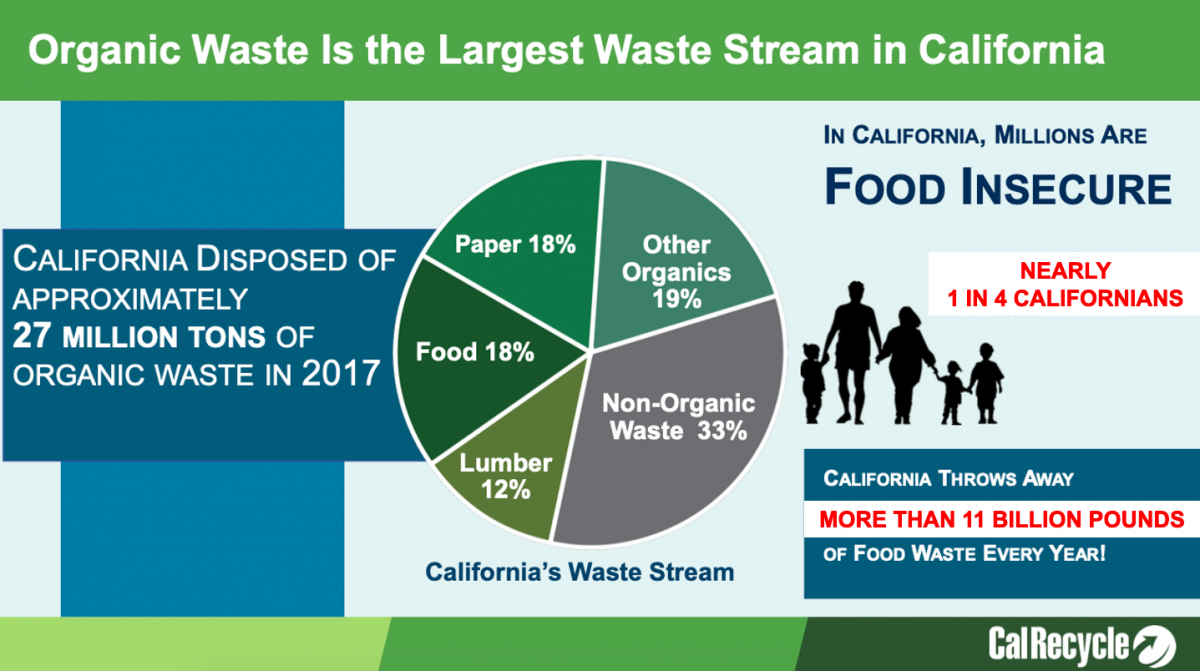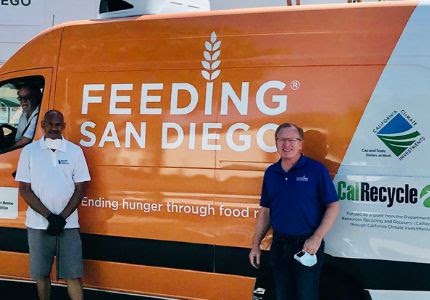Posted on 1 February 2021 By Dr. Jim Stewart & Hoiyin Ip
Nearly one in four Californians suffer from food insecurity.
Yet more than 11 billion pounds of edible food is wasted every year in California.
Organic waste, including food waste, decomposes in landfills releasing methane emissions that account for 20% of the state’s methane. Methane is a short-lived climate super pollutant 84 times more potent than carbon dioxide. Reducing methane has the fastest impact on the climate crisis.
In 2016, Gov. Brown signed Senate Bill (SB) 1383 Short-Lived Climate Pollutants that requires all cities, counties and special districts (jurisdictions) with solid waste collection to ensure their waste transfer/processing facilities and operations increase diversion away from landfills of organic waste, recover edible food, and purchase recovered organic waste products such as compost, mulch, biofuels and paper. (Note that in this discussion, the term “organic” refers to all waste of biological origin, not to “certified organic foods.”)
The main statewide targets of SB 1383 are:
• By 2020, divert 50% of organic waste landfill disposal.
• By 2025, divert 75% of organic waste landfill disposal, and increase edible food recovery by 20% for distribution to people in need.
California failed to meet the 2020 target. In 2022, enforcement will start, penalties for noncompliance will be assessed by the California Department of Resources Recycling and Recovery (CalRecycle), and could face up to $10,000 a day.

Graphic courtesy of CalRecycle
Implementation of SB 1383 is now frequently discussed at cities and counties meetings across the state. This is the time for you to be a local environmental cheerleader, supporting your elected officials to adopt policies that address both equity and climate issues.
Sierra Club California is launching the Organic Waste Reduction Campaign to promote a list of actions for local governments to take. Please email it to your city council, board of county supervisors or district directors, asking them to incorporate organic waste diversion as a multi-benefit initiative including feeding hungry people, producing clean energy and healthy soil, reducing climate and air pollution. Please also speak remotely at your local government meetings urging action, whether or not it is on the agenda, and reach out to engage other organizations and individuals. Hunger and climate are urgent crises needing powerful action now.
The Sierra Club is proposing three outcomes with seven categories of actions for SB 1838 compliance. Here’s a glimpse.
1. Feed the Hungry
Through SB 1383 and its partnership to feed Californians and fight climate change, CalRecycle calls for actions against the COVID hunger emergency. The pandemic has not only worsened food insecurity, but also brought serious challenges to the charities that address food insecurity with increased demand for food, and decreased funding. According to Voice of OC’s article Orange County Food Banks and Pantries Could Struggle to Keep Pace with 2021, the Power of One Foundation fed a million people in the first six months of the pandemic, then another million in the following three months. To meet this increase, these charities must cover increasings costs from transportation, staffing, etc. And we must also remember that we are doing this to fight the climate crisis. A solar powered refrigeration center costs about $70,000, for example, and that’s the sort of thing that private public partnerships can help pay for if we show up as advocates. Ask your local governments to support and fund charities that feed the hungry in addition to ensuring all available edible food is provided to them (beyond the minimum of 20% and before 2025).

2. Conserve Natural Resources
Water is a particularly precious resource in California. Compost helps soil retain water, and is a recovered organic waste product. Cities and counties are required to purchase it, and adopt Model Water Efficient Landscape Ordinance for compost application. But do you want your food grown using compost that contains plastics and chemicals? Minimizing contamination is another reuirement of SB 1383. Urge your city and county to continuously regulate to reduce use of single-use plastics and pesticides in homes and businesses.

3. Slow Down Climate Change
Can we say more about methane? Existing landfills with decades of food waste are currently emitting methane, and we must ensure this highly potent greenhouse gas is not allowed to escape and cause more damage to the atmosphere. Ask your city and county to require their anaerobic digestion and compost facilities report results of regular surveys for methane leaks, and prominently post progress reports online documenting the status of their efforts on diminishing methane.
The Organic Waste Reduction Campaign is being initiated by Sierra Club California Energy-Climate and Zero Waste Committees. It will be presented at the Sierra Club California Conservation Committee on February 20. For more information, contact the Committees or your Chapter office.
Header Image: via CalRecycle
Dr. Jim Stewart is the co-chair of Sierra Club California Energy-Climate Committee.
Hoiyin Ip is the co-chair of Sierra Club California Zero Waste Committee.
